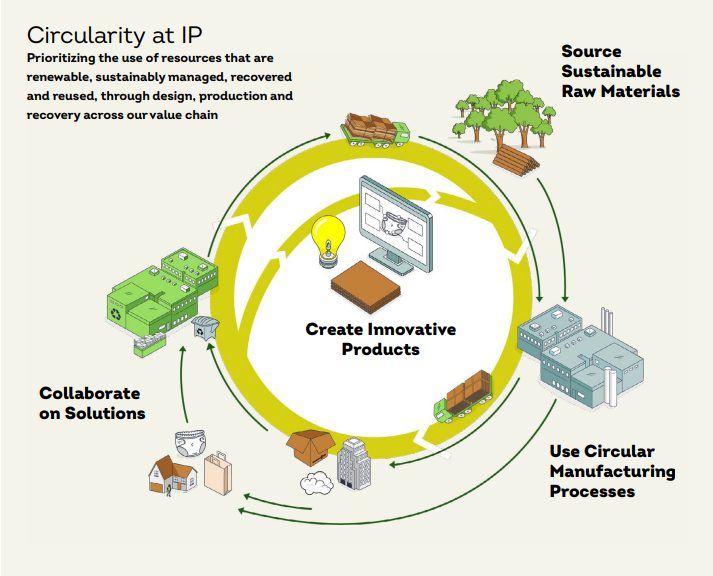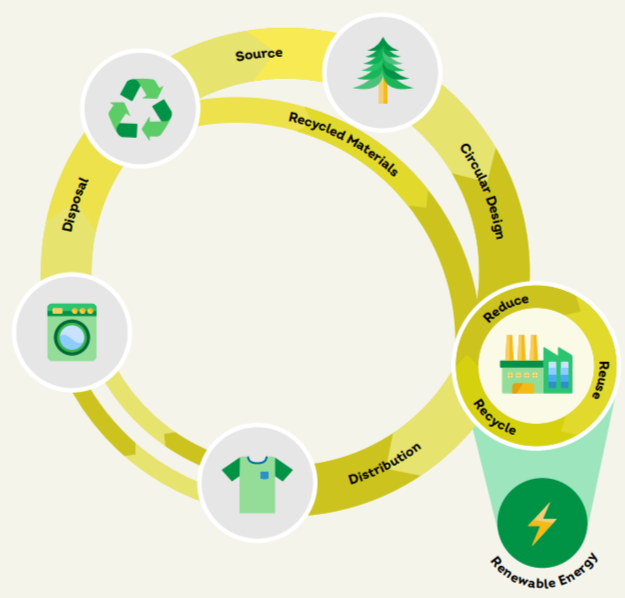International Paper's Approach to Renewable Solutions
Originally published in International Paper's 2021 Sustainability Report
Create Innovative Products
Products are the primary mechanism through which International Paper can contribute to a low carbon, circular economy. They are the start and endpoint of any life-cycle analysis, and every decision we make along that continuum will influence value chain inputs, efficiencies and recovery.
We are designing circular solutions to turn our decision points into innovative products that are:
- Designed to be made efficiently and sustainably, from sourcing to production to transportation
- Designed with end-of-life in mind
- Easily recovered, recycled, reused or composted
Learn more about our 2021 product innovations here.
Our strategy is shaped by the vision and principles of the Ellen MacArthur Foundation, the world’s leading circular economy network, which we joined in 2021. Through our membership, we are working with the Foundation and its Network partners to advance our contributions to circular, low-carbon solutions.
Source Sustainable Raw Materials
We source raw materials for our products that are:
- Renewable and sustainable
- Sourced from sustainable sources
- Recycled or recyclable
Our largest raw material is fiber. We source both renewable virgin fiber from trees grown in sustainably managed forests and recycled fiber. We collaborate with foresters and non-governmental organizations to implement best practices that promote forest sustainability and protect ecosystems. Our commitment links back to one of the three principles of circularity — to regenerate natural systems. Because our products are made out of renewable resources and hold carbon during their life, they can replace less sustainable, carbon intensive, non-renewable products.
We want to use renewable, recycled or recyclable materials as much as we can. Across our manufacturing process we want to ensure that, wherever we are not using renewable materials, we are using recyclable or recycled materials. Every year, our operations recycle 5 million tons of recovered fiber to make new fiber-based products
Learn more about our sustainable forestry practices here
and more about our use of recovered fiber here.
Use Circular Manufacturing Processes
Circular manufacturing processes describe our efforts to shift to lower carbon operations, by:
- Designing out waste and pollution from our manufacturing processes
- Maximizing the use and reuse of all materials, resources, byproducts and residuals
We advance circular solutions in our manufacturing processes by cutting the waste we send to landfills to reduce energy use and associated GHG emissions. We can maximize resources in our manufacturing processes by 1) designing out waste and pollution and 2) by making the most of our use and reuse of all materials, resources, byproducts and residuals.
In 2021, 48% of our manufacturing waste was diverted from the landfill for beneficial uses. For example, the ash created when we burn tree bark and other residuals is used to stabilize pH levels in farmland. Dry ash can be used in road construction and the manufacture of concrete. Certain wood byproducts are used to make everyday products such as paints, fabrics, lubricants and even cosmetics.
Nearly 70% of the energy we use in our mills was derived from carbon-neutral biomass generated from the residual components of trees that cannot be used to make our products — a circular process. You can read about our ongoing initiatives to increase our use of renewable energy in our Sustainable Operations chapter.
EXAMPLES OF BENEFICIAL REUSE
Ash: Generated from the combustion of tree bark in our boilers, ash has agronomic value. Because it contains micronutrients, farmers can use the ash to stabilize the pH of the soil.
Dry ash: Also called “fly ash,” dry ash can be used in road construction and in the manufacture of materials such as concrete blocks and bricks.
Other wood byproducts: These are used to make products we use every day, such as paints, fabrics, tires, lubricants, shampoo and even cosmetics.
Collaborate on Solutions
Strategy Collaboration across our value chain, with its emphasis on driving innovative thinking through diverse points of view, is core to our success. We collaborate on solutions with customers, our supply chain and thought leaders to:
- Generate value through innovative, circular product solutions to meet customer needs
- Respond to changing market conditions and consumer demands
- Partner with others to ensure final products enjoy multiple lives through repeated cycles of reuse, recovery and recycling The teams at our research and development centers are at the forefront of our creative solutions for customers.
Learn more about some of our 2021 collaborations here.
What is the Circular Economy?
The circular economy is an economic system based on recovering, recycling and reusing products and materials. Often referred to as “circularity”, the key principles of the system include:
- Designing out waste and pollution
- Keeping products and materials in use
- Regenerating natural systems
A circular economy minimizes waste and makes the most of resources with continual points of recovery, reuse or recycling. This is the opposite of a linear, or “take-makewaste,” model of production and use, where a product is used once and thrown away. More than basic recycling, participating in the circular economy means we start with the design of our products so that every byproduct of the manufacturing process is put to good use and the final products can enjoy multiple lives through repeated cycles of reuse, recovery and recycling. By designing out waste and designing in efficient processes across our value chain, we are able to reduce our GHG emissions and contribute to a low-carbon economy.
About International Paper
International Paper (NYSE: IP) is a leading global producer of renewable fiber-based products. We produce corrugated packaging products that protect and promote goods, and enable worldwide commerce, and pulp for diapers, tissue and other personal care products that promote health and wellness. Headquartered in Memphis, Tenn., we employ approximately 38,000 colleagues globally. We serve customers worldwide, with manufacturing operations in North America, Latin America, North Africa and Europe. Net sales for 2021 were $19.4 billion. Additional information can be found by visiting internationalpaper.com.





